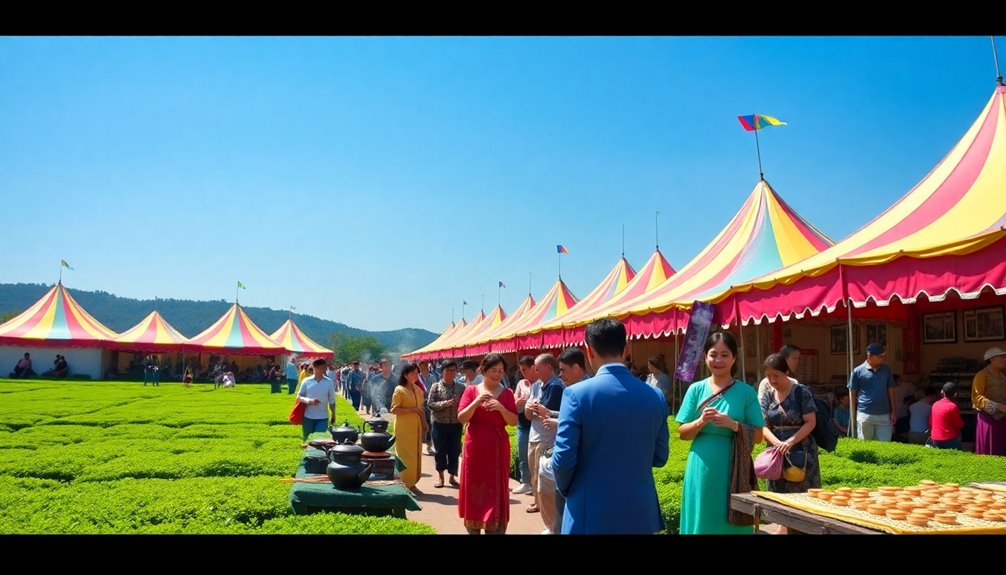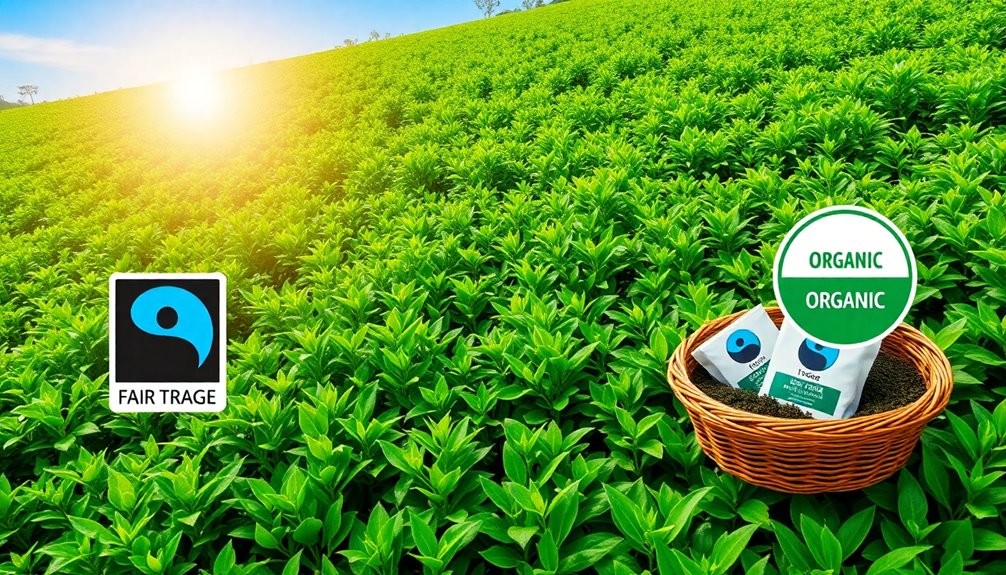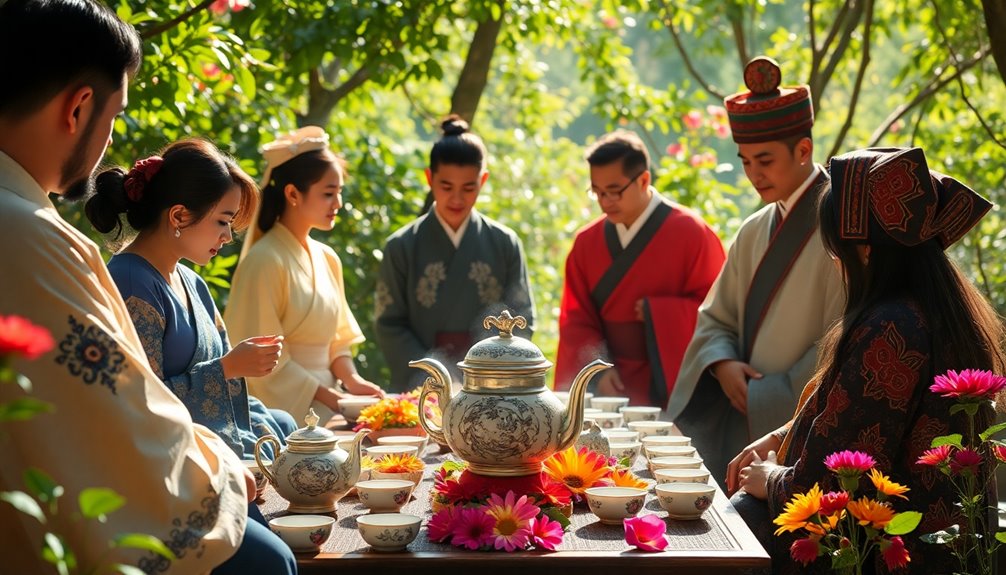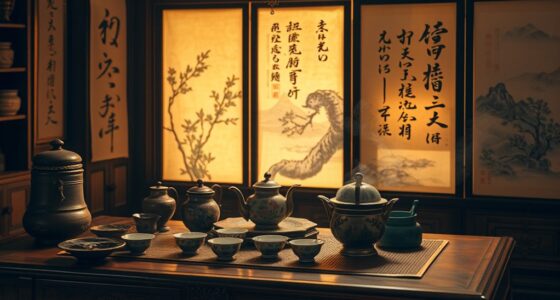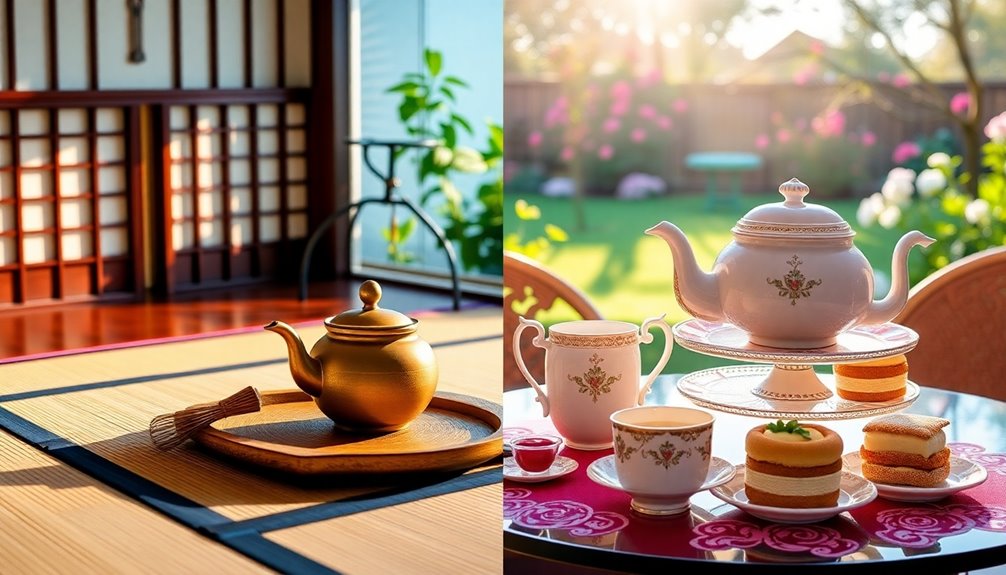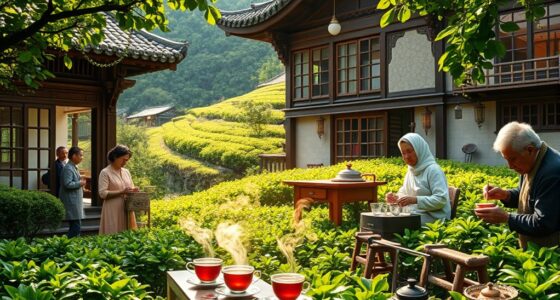Tea festivals around the world showcase the heart of tea culture with exciting celebrations. Events like the Hangzhou Tea Culture Festival and the Assam Tea Festival let you explore diverse traditions and taste unique teas. You can watch traditional tea ceremonies, participate in cooking competitions, and enjoy cultural performances. Workshops give you a chance to learn about tea's origins and sustainable farming. Festivals also promote community and mindfulness through shared experiences. When you attend, you'll see how tea connects people in many ways. Stick around to discover even more fascinating tea traditions and events waiting for you!
Key Takeaways
- Global tea festivals like the Hangzhou Tea Culture Festival celebrate diverse tea traditions and artistry in preparation and serving.
- The Assam Tea Festival showcases local culture through performances, connecting communities with their tea heritage.
- Workshops at events, such as the World O-CHA Festival, educate attendees on sustainable tea farming practices and tea origins.
- Traditional tea ceremonies featured at festivals, like Chanoyu, promote mindfulness and enhance the cultural experience of tea consumption.
- Culinary competitions at tea festivals highlight innovative dishes that integrate specific teas, showcasing their versatility in gastronomy.
Introduction
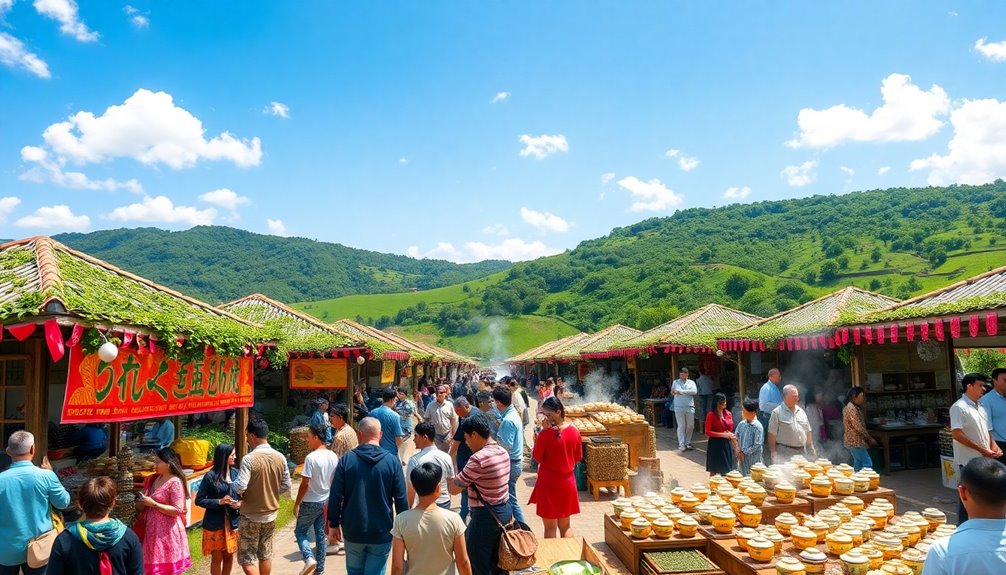
Tea culture festivals have blossomed into vibrant global events that celebrate the rich history and diverse significance of tea. These festivals offer a wonderful chance for you to explore the many tea traditions from around the world.
Imagine stepping into a lively atmosphere filled with tea enthusiasts eager to share their passion for unique flavors and cultural stories.
At these festivals, you'll discover traditional tea ceremonies that highlight the artistry involved in preparing and serving tea. Educational workshops invite you to learn more about the origins of tea, dating back to ancient China with Emperor Shen Nong. You can participate in tastings that allow you to savor different varieties while deepening your appreciation for each one.
Notable events like the Hangzhou Tea Culture Festival and Uji Tea Festival draw visitors from various corners of the globe, uniting the tea community in celebration.
These festivals not only preserve tea traditions but also foster connections as people exchange ideas and experiences. So, whether you're a seasoned tea lover or just curious to learn more, there's something for everyone at these exciting gatherings. Join in and immerse yourself in the world of tea!
Global Tea Heritage Celebrations
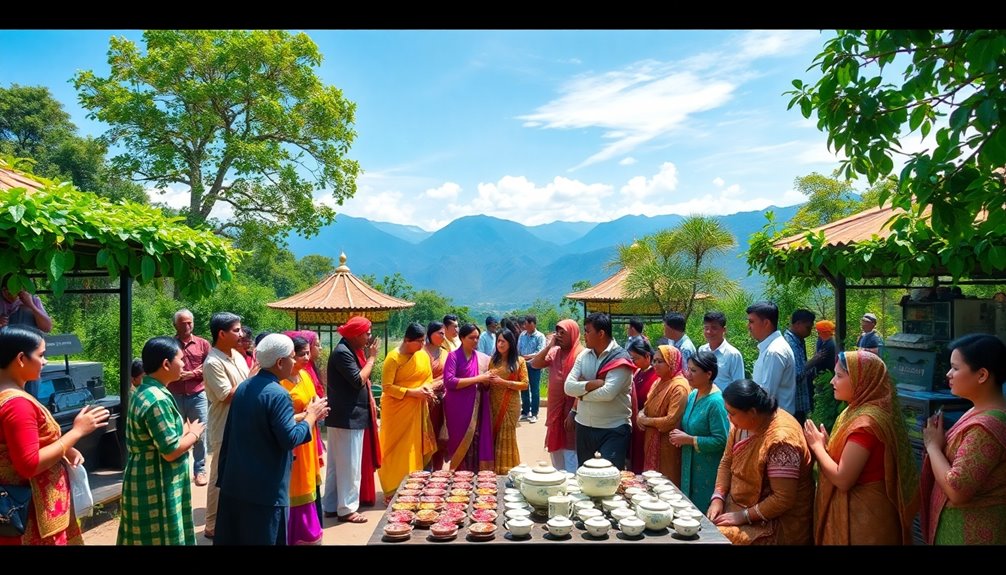
Across the globe, tea heritage celebrations bring together cultures and communities, showcasing the unique traditions associated with this beloved beverage. Events like the Assam Tea Festival in India highlight local tea culture through exciting cultural performances and traditional methods.
You can dive into the immersive experience of tasting different teas while learning about their origins.
In Japan, the World O-CHA Festival draws thousands of visitors, celebrating sustainable tea farming and its significance in society. Meanwhile, the inaugural Nigerian International Tea Festival, set for October 2024, promises to spotlight Nigeria's tea potential with workshops and exhibitions.
These festivals not only celebrate tea but also provide networking opportunities for tea brands and professionals. You can connect with others who share your passion for tea at events like the World Tea Expo in the USA, where you'll discover the latest trends in the tea industry.
Additionally, the Melbourne and Kyoto Tea Festivals invite you to appreciate traditional tea rituals that reflect cultural philosophies.
Each celebration offers a chance to explore the richness of global tea heritage while enjoying delicious teas and connecting with fellow enthusiasts!
Cultural Rituals Surrounding Tea
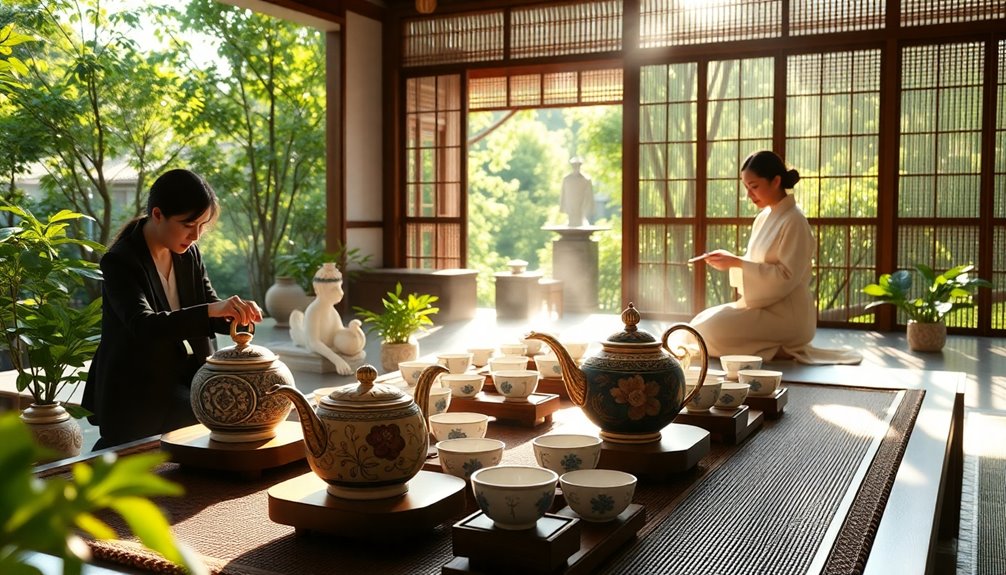
In many cultures, the rituals surrounding tea elevate it beyond a mere beverage to a profound experience of connection and mindfulness. Traditional tea ceremonies, like the Gongfu tea in China and the Chanoyu in Japan, showcase the rich cultural significance of tea. These ceremonies encourage mindful drinking, where every step—from preparing the leaves to serving the tea—becomes an art form that fosters appreciation and respect.
At tea festivals, you can dive into workshops on tea, allowing you to explore traditional practices. You might learn about the Chinese Tea Ceremony or Daoist Gongfu, where sensory engagement and personal connection with each sip create a reflective experience.
These festivals often feature cultural performances, like local music and dance, enhancing the significance of tea in community life. Communal gatherings and seasonal tea deliveries also play a role in some tea cultures. They celebrate tea as a means of building relationships and promoting a contemplative lifestyle.
Tea-Infused Culinary Competitions
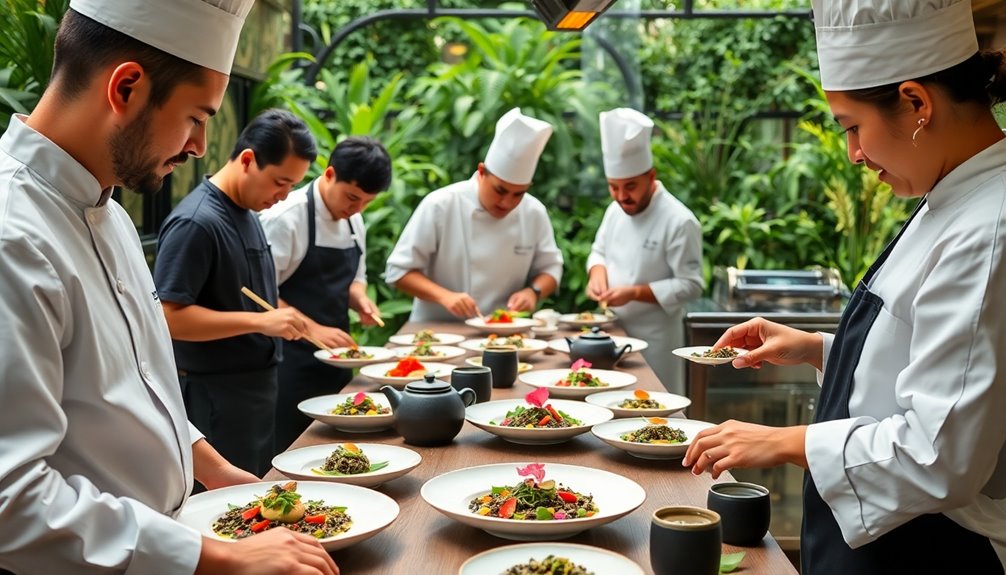
Showcasing the remarkable versatility of tea, culinary competitions at festivals have become a highlight for food enthusiasts and chefs alike.
These tea-infused culinary competitions invite talented chefs to create innovative dishes that spotlight tea's role in gastronomy. At events like the World Tea Expo, chefs craft signature meals using specific teas, promoting culinary excellence.
Judges evaluate each dish based on flavor balance, presentation, and how well tea is integrated into the recipes. This creates a thrilling atmosphere where the art of cooking meets the rich flavors of tea.
Attendees get to taste and vote on their favorites, ensuring engaging participation and making everyone feel like a part of the action.
Beyond the excitement, these competitions celebrate health-conscious cooking and sustainable cooking practices. Many chefs focus on using fresh, local ingredients, creating dishes that not only taste great but are also good for you.
Environmental Impact of Tea Farming
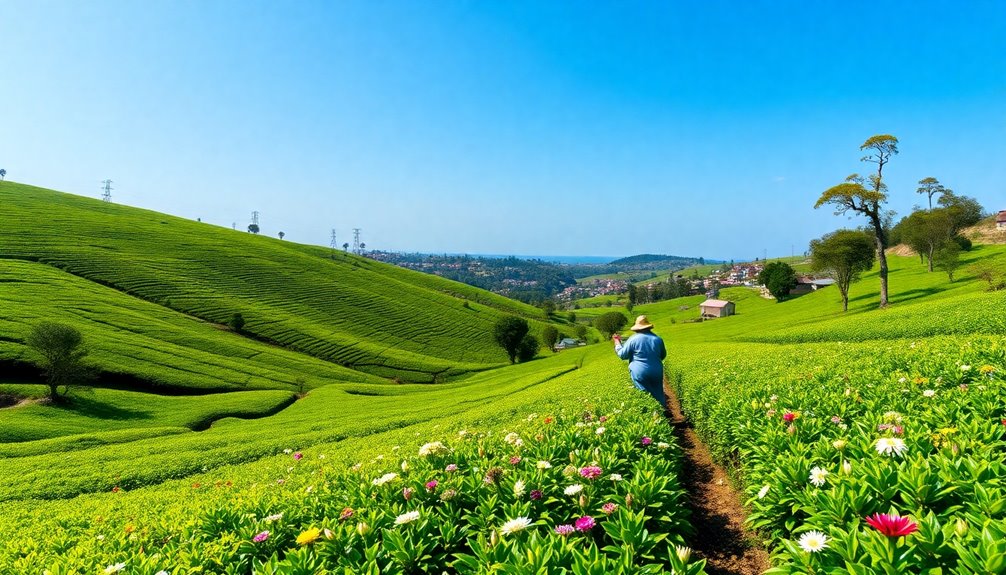
The environmental consequences of tea farming can be profound, affecting ecosystems and communities alike. When land is cleared for tea plantations, it often leads to deforestation, disrupting local habitats and causing biodiversity loss.
You may not realize it, but conventional tea farming usually involves significant chemical use, such as pesticides and fertilizers. This can degrade soil quality and pollute nearby water sources, impacting both agriculture and local communities.
However, there's good news! Sustainable tea farming practices, like organic cultivation and agroforestry, can help reduce these environmental impacts. By promoting biodiversity and minimizing chemical use, these methods create healthier ecosystems.
Water consumption in tea production is another concern. Efficient irrigation practices are essential to conserve water resources, especially in regions where water is scarce.
Plus, climate change threatens tea cultivation, as rising temperatures and changing rainfall patterns can affect the quality and yield of tea crops globally.
Practical Applications
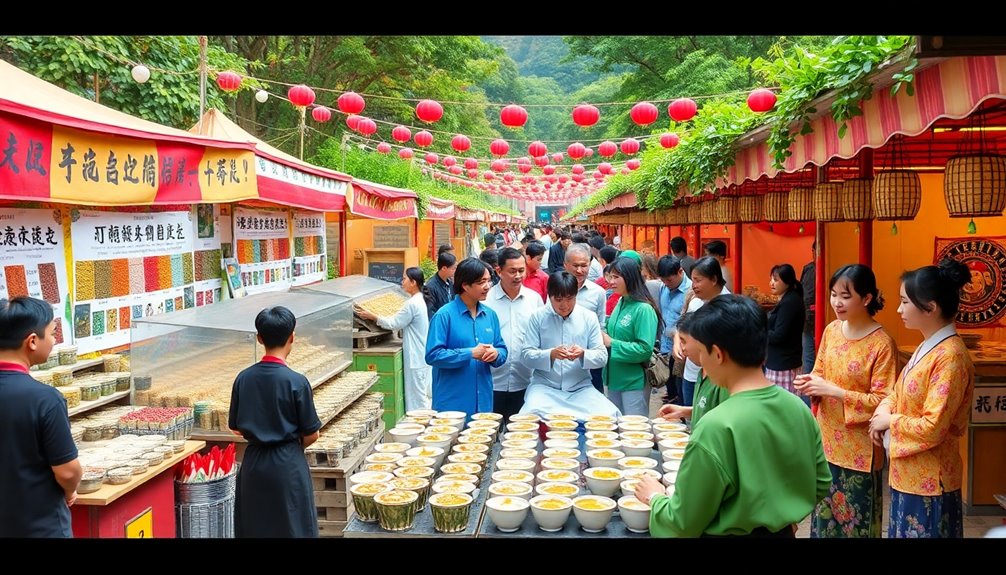
Many tea festivals around the world offer practical applications that deepen your appreciation for the beverage and its cultural significance. These events provide immersive experiences that let you dive into tea culture.
You can participate in traditional tea ceremonies, where you'll learn the art of serving and enjoying tea in a meaningful way. Workshops at festivals like the World Tea Expo teach blending and brewing techniques, ensuring you leave with new skills.
During tea tastings, you can explore different flavors and aromas, enhancing your understanding of diverse teas. Educational sessions cover topics like tea cultivation, health benefits, and artisanal production methods.
Festivals such as the Hangzhou Tea Culture Festival and the Uji Tea Festival offer unique experiences like guided tea-picking and ceremonies, fostering cultural appreciation.
You'll also find networking opportunities, connecting with producers, vendors, and fellow tea lovers, which can lead to exciting collaborations in the tea industry.
Lastly, events like the World O-CHA Festival raise awareness of sustainable tea practices, engaging younger generations in the community.
Frequently Asked Questions
What Is the Cultural Hearth of Tea?
The cultural hearth of tea originates in ancient China, around 2737 BCE, where Emperor Shen Nong discovered its soothing properties. You'll find that tea embodies centuries of traditions, rituals, and connections across various cultures today.
What Is Tea Festival?
A tea festival's an event celebrating tea's culture and history. You'll explore local and international varieties, participate in tastings, workshops, and ceremonies, and deepen your appreciation for this beloved beverage and its traditions.
What Is the Cultural Significance of the Tea Ceremony?
The tea ceremony's cultural significance lies in its embodiment of mindfulness, connection, and tradition. You experience harmony and respect while fostering relationships, creating a serene environment that transcends mere drinking, transforming it into a profound ritual.
What Is the Cultural Heritage of Tea?
Tea's cultural heritage reflects centuries of tradition, symbolizing hospitality and connection. You'll find it woven into rituals, ceremonies, and communal gatherings, embodying shared experiences that celebrate diverse customs and foster understanding between different cultures.
Conclusion
In conclusion, celebrating tea culture through festivals brings people together in fun and meaningful ways. You can explore global tea heritage, enjoy tasty tea-infused dishes, and learn about the importance of tea farming for our planet. So, whether you're sipping a warm cup or joining a local celebration, you're part of a rich tradition. Dive into the world of tea and discover its heart—there's always something new to experience and enjoy!

